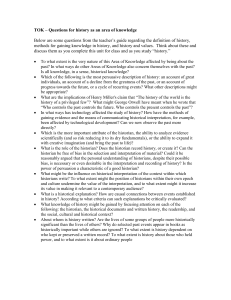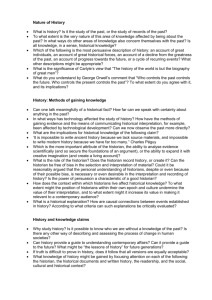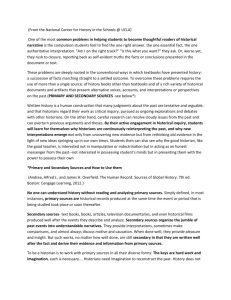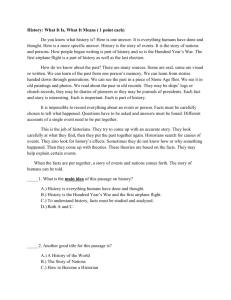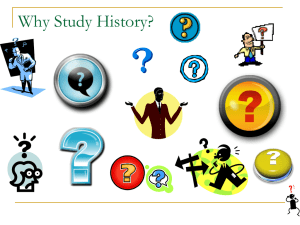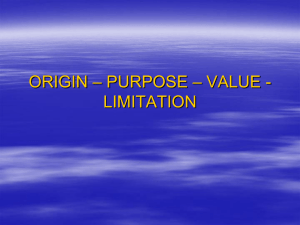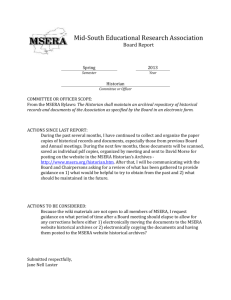Perspective What is History - White Plains Public Schools
advertisement
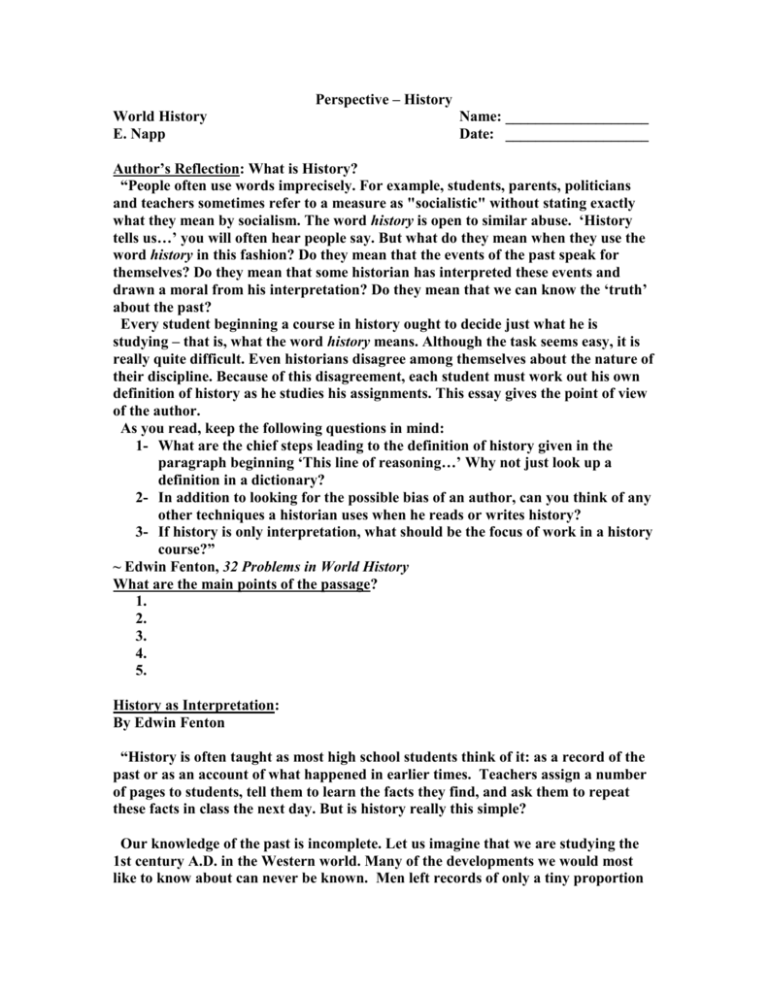
Perspective – History World History E. Napp Name: ___________________ Date: ___________________ Author’s Reflection: What is History? “People often use words imprecisely. For example, students, parents, politicians and teachers sometimes refer to a measure as "socialistic" without stating exactly what they mean by socialism. The word history is open to similar abuse. ‘History tells us…’ you will often hear people say. But what do they mean when they use the word history in this fashion? Do they mean that the events of the past speak for themselves? Do they mean that some historian has interpreted these events and drawn a moral from his interpretation? Do they mean that we can know the ‘truth’ about the past? Every student beginning a course in history ought to decide just what he is studying – that is, what the word history means. Although the task seems easy, it is really quite difficult. Even historians disagree among themselves about the nature of their discipline. Because of this disagreement, each student must work out his own definition of history as he studies his assignments. This essay gives the point of view of the author. As you read, keep the following questions in mind: 1- What are the chief steps leading to the definition of history given in the paragraph beginning ‘This line of reasoning…’ Why not just look up a definition in a dictionary? 2- In addition to looking for the possible bias of an author, can you think of any other techniques a historian uses when he reads or writes history? 3- If history is only interpretation, what should be the focus of work in a history course?” ~ Edwin Fenton, 32 Problems in World History What are the main points of the passage? 1. 2. 3. 4. 5. History as Interpretation: By Edwin Fenton “History is often taught as most high school students think of it: as a record of the past or as an account of what happened in earlier times. Teachers assign a number of pages to students, tell them to learn the facts they find, and ask them to repeat these facts in class the next day. But is history really this simple? Our knowledge of the past is incomplete. Let us imagine that we are studying the 1st century A.D. in the Western world. Many of the developments we would most like to know about can never be known. Men left records of only a tiny proportion of all the events that took place. They recorded the names of famous men and women and something about their lives. Archives tell us a little about Church affairs and some of the more notable political struggles. Literature written during the period and the remains of buildings reveal still further information. But most of what happened was never recorded, and much that was recorded has been lost since the fall of Rome. Just think of all the things we do not know. We have few accurate statistics on population or trade or government income. We know next to nothing about the lives of the poor. We are not sure what motivated most of the individuals who adopted or rejected Christianity. One of the major reasons historians disagree so much about the history of Rome is that their data are so fragmentary. We probably know only a fraction of 1 per cent of what has happened in the past. So history cannot be a complete record of what happened; at best it can be a record only of those events that were recorded in a form that has come down to us. This conclusion is particularly significant. It implies that the historian must be able to judge whether or not the documents he finds contain information accurately representative of the events that took place. Because most documents were written by men who were better educated and more intelligent than the average, is it not likely that the records we have reflect disproportionally the point of view of the educated upper classes? How much must we question these accounts because of this possible bias? The task of reconstructing exactly what happened is enormous. We can only approximate the “truth” about the past; we can never know it fully. A historian cannot learn everything about an event or period. Let us suppose that a scholar set out to read in the original languages all remaining source material about the 1st century and to supplement his knowledge by examining buildings and other artifacts from this period. He would have to become an accomplished linguist. Then he would be forced to travel all over the Western world reading manuscripts in a number of languages and looking at ruins in Mediterranean lands and in museums. No one man could read and see everything in one lifetime. Any history he wrote, therefore, could not possibly be a tabulation of everything that had been recorded; it could be a tabulation only of what one scholar had been able to find and investigate. What are the main points of the passage? 1. 2. 3. 4. 5. A historian must select from available material. It would be absurd if he listed in chronological order all the facts he discovered. We would be bored to death if we read such a compilation, and any publisher who printed it would lose money. A historian could not even take down in his notes all the material he researched. He would be forced to select information to note on his cards, just as students doing research in the library note down some things and omit others. But as soon as the historian makes a note of one event and decides not to make a note of another, he interprets. He says, in effect, "This fact is important, and the other one is not." But how does he know what is important, what is worth noting down? He already has in mind an interpretation of history in order to make this decision. Let us suppose, for example, that a historian is trying to explain the origins of the fall of Rome. In doing research, he makes a note of everything he can find out about the lives of the Roman emperors in the 1st century A.D. At the same time, he decides not to jot down information about economic life during this period. Clearly he believes that the lives of emperors are more important to what he is explaining than is the development of an economic system. He makes an interpretation of history when he acts in this fashion, implying that the activities of political leaders are more important than economic developments to the decay of empires. Now this may be so, but whether the historian is correct is beside the point. What is significant to us is that he has interpreted in the very process of taking notes. He can do nothing else. Either he notes everything, or he selects. If he selects, he does so with some principles in mind. As soon as' he establishes principles of what is important, he interprets. A textbook cannot be a record of what has happened in the past. It can only be an interpretation of what happened by the historian or historians who wrote it. The typical author of a textbook in world history is an expert in one area – for example, the history of France or the development of imperialism. Although he has read extensively about other areas and periods he describes in his textbook, he cannot be expert on every topic. Instead of reading the manuscripts – the original records – of each area, he reads accounts written from these records by other historians. His text is, therefore, at least third hand. A person who witnessed the event wrote the firsthand account; of course, if this record came from the pen of a man who was simply writing down what he had been told by another person, it is second hand. The next account was written by a historian who interpreted the original source according to his own opinions of the nature of history. Finally, the author of the textbook decided which of several historians' interpretations was correct and included it in his book. A historian interprets not only by selecting certain material, but also by presenting it in a certain way. Suppose that the author of a textbook decided to try not to interpret, but only to list facts and let the reader draw his own conclusion. He is only deceiving himself, and if you believe that he can do this, he is deceiving you too. He must select the facts he includes in his book and eliminate other facts because space is limited. Let us suppose that he decides that students should know something about the causes of the First World War. He might then make a list of “significant” events as follows: Formation of the Triple Alliance, 1882 Formation of the Entente Cordiale, 1904 First Moroccan crisis, 1905 Austrian annexation of Bosnia and Herzegovina, 1908 Second Moroccan crisis, 1911 First Balkan War, 1912 Second Balkan War, 1913 Assassination of Francis Ferdinand, 1914 Outbreak of World War I, 1914 By arranging these events in a list and printing them in a book, our historian implies that they are related and important. Otherwise, why list them and why learn them? Students can quickly see that each event concerns either the formation of an alliance or an international crisis and that this list of events ends with the outbreak of World War I. A student might well come to the conclusion that the alliance system led to a number of incidents which eventually touched off war. This is an interpretation of history. Some historians have argued that economic rivalry, or the race to acquire colonies overseas, was largely responsible for the war. By selecting one series of events and omitting others, a historian leads his readers to select one interpretation of history and to reject or disregard a second. What are the main points of the passage? 1. 2. 3. 4. 5. This line of reasoning leads inevitably to the conclusion that all history is interpretation. Sometimes we call it an argument, to emphasize the interplay of evidence and conclusion. What is important about history as a discipline is the set of rules to be followed in making interpretations, rules that we will learn. History is really a way of reading and writing about events in the past. Professional historians write about the past according to the rules accepted by their peers. If we are to study history intelligently, we must learn the rules historians follow when they interpret. Take the matter of the bias of an author, for example. Not all books are equally reliable as sources of information; in fact, some are specifically designed to present one point of view rather than a balanced account of a problem. Even when an author tries carefully to present the “truth” about a matter, unconscious bias may mislead him. A Protestant may approach the history of the Reformation, for example, with a point of view quite different from that of a Roman Catholic. Despite a conscientious attempt to attain objectivity, his pen may still be guided subtly by an attitude toward religion he has had all his life. Historians should always try to determine the bias of an author they are reading; this is a rule of their craft. We know a number of ways to detect bias, and each student of history should learn to use them… Studying history properly requires an alert, active mind; a student must constantly be aware that he is reading someone's interpretation of the past. So he must search for it, knowing that in books which seem to be primarily collections of facts it is often implied rather than stated in so many words. One way to train oneself to find interpretative statements is to skim quickly over an assignment, reading the first paragraph, the first sentence of every other paragraph, and the conclusion. This preliminary skimming will reveal what the author is discussing and will often disclose the interpretation he presents. Then careful reading will permit the student to find and judge the evidence for the author's argument. This skill – the ability to find an argument and to determine whether or not evidence supports it – is an important historical technique as well as vital preparation for citizenship. It will put the student on guard against accepting everything he reads or hears without applying adequate tests of reliability. Thus he will become an effective member of a democracy. What are the main points of the passage? 1. 2. 3. Analyze the following cartoons:

